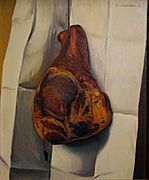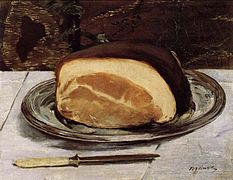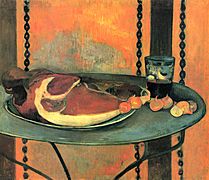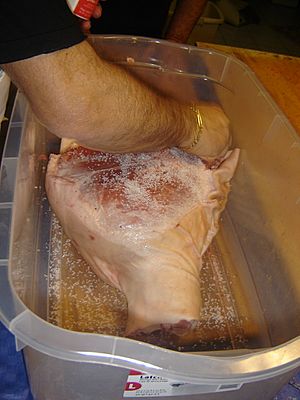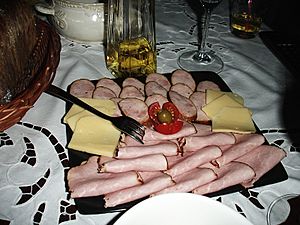Ham facts for kids
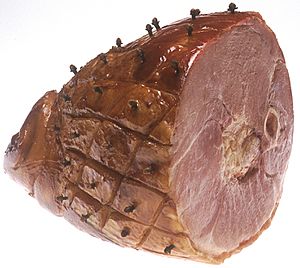
Ham is a popular type of meat that comes from the upper leg, or thigh, of a pig. It is a kind of pork, which is the general name for any meat from a pig. Ham is enjoyed all over the world in many different ways!
Ham can be prepared in two main ways: dry-cured or wet-cured. Dry-cured ham is made by rubbing the meat with a special mixture, usually with lots of salt. Then, it is carefully dried and aged for a long time. Wet-cured ham is made by soaking the meat in a salty water solution called brine.
Some famous kinds of dry-cured ham include:
- Prosciutto crudo (from Italy)
- Prosciutto di Parma (also from Italy)
- Jamón serrano (from Spain)
- Jamón iberico (also from Spain)
- Country ham (from the United States)
- York ham (from England)
- Westphalian ham (from Germany)
Ham is also used in other foods, like SPAM.
-
Le jambon (Édouard Manet, c. 1875).
-
Le jambon (Paul Gauguin, 1889).
Contents
How Ham is Made
Ham is made by curing raw pork. Curing helps to preserve the meat and gives it a special flavor. The two main ways to cure ham are salting (also called dry curing) or brining (also called wet curing). Sometimes, ham is also smoked for extra flavor and preservation.
Besides salt, other ingredients can be added to ham. These might include different herbs and spices. For example, some hams use black pepper, while others might use saffron for a unique taste.
Dry-Cured Ham
To make dry-cured ham, the raw pork leg is first cleaned. Then, it is covered in salt. The salt helps to draw out moisture and preserve the meat. Sometimes, special herbs and spices are added during this step to give the ham more flavor.
After salting, the hams are washed. Then, they are hung in a cool, dark place with controlled temperature. They stay there until they are dry. After this, they are hung to air for an even longer time. This aging process can take many months. For example, Serrano ham cures for 9 to 12 months. Parma hams take more than 12 months. Some Iberian hams can take up to 2 years to get their perfect flavor!
Many modern dry-cured hams also use special salts called nitrites. These are added along with regular salt. Nitrites help to stop harmful bacteria from growing. They also give the ham its nice dark red color.
Wet-Cured Ham
Wet-cured hams are made by soaking the meat in a brine. A brine is a salty water solution. Sometimes, other ingredients like sugar are added to the brine for extra flavor. The meat usually stays in the brine for about 3 to 14 days. This process also makes the ham a little heavier and larger.
Another way to wet-cure ham is by pumping the curing solution directly into the meat. This method is faster. It can also make the ham even heavier than soaking it. Pumping the solution also helps the salt spread more evenly throughout the meat. This quicker process usually finishes in just a few days.
Smoking Ham
After curing, ham can also be preserved by smoking. This means the meat is placed in a smokehouse. Here, it is treated with smoke from burning wood. Smoking adds a deep, rich flavor to the ham. It also helps to preserve it even more. The smoke gives ham its unique smell and taste.
How Ham is Used
Ham is often sliced thin. It is very popular as a filling for sandwiches. Think of a classic ham sandwich or a ham and cheese sandwich! Other popular sandwiches include the croque-monsieur and the Cubano. Ham is also a favorite topping for pizza in many places, especially in the United States.
In the United Kingdom, a pork leg that has been cured but still needs cooking is called gammon. When you cook gammon, it becomes ham. Large roasted hams are a traditional part of British Christmas dinners.
Images for kids
-
Hams aging in an atmospherically controlled storage room in Mazerolles, Béarn, Pyrénées-Atlantiques
See also
 In Spanish: Jamón para niños
In Spanish: Jamón para niños


